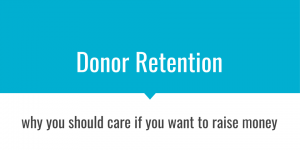Extending the donor communication life cycle is crucial if you want new (and new-ish) donors to continue giving to your organization. Before you get to the end of a campaign or campaign year, a plan for how all donors are going to be stewarded should be in place. Donors are the heroes, so we pulled this post from the vault to help you try out some less boring and more effective ways of saying “thank you” to help keep them coming back for more.
We’re always thinking and talking about new ways to make fundraising asks more personal, more relevant, and more impactful. Over the last few months we have presented several ways that fundraisers, particularly those in the non-profit and education space, can do exactly this. And while the importance of developing integrated approaches to making the ask is always top of mind, very little time is allotted to properly thank the many individuals making the contributions that sustain these organizations year after year. More often than not come the end of a campaign, thank you’s end up looking as strapped for time and resources as the development teams putting them together.
All our donors really want is a meaningful thanks that shows up soon after they contribute and keeps them engaged by letting them know how their dollars were put to work. In an effort to help you do this, we’ve compiled a list of ways to thank your donors that go beyond those tried and truly boring form letters.
- Get creative with your opening line
On behalf of our staff and board, we’d like to… STOP! This opening line and others like it are not fooling anyone. Letter communications that are personal and make a connection with the reader are the ones that people actually finish reading. Donors, especially first-timers, are testing your organization. Not only do they want to know you’re using their money properly, but they want to feel acknowledged and celebrated. Try starting your letters off with something like “We did it!” or “You seriously made my day.” Right off the bat, your recipient is going to want to know what they did to warrant this type of statement instead of feeling like they’re just one in a pile of hundreds getting the same letter and undifferentiated from the crowd. Keep your donor feeling like a hero.
2. Have someone else say thanks
Behind every fundraising organization or institution is a beneficiary. Whether you’re working to help the disabled, support your students, or clean up and preserve your local green spaces, someone is benefiting from the efforts you’re making. Recruit some of these individuals to thank your donors. You could also ask your board members to send handwritten thank you notes to people who’ve donated. This way, you’re connecting your donors with the real people they’re helping and giving life to abstract descriptions of the impact you strive to make everyday. It’s also a great way to continue telling meaningful stories that help to perpetuate the giving cycle.
3. Create pathways for engagement
The last thing you should be doing in your follow up communications is making another obvious ask. One of the best ways to ensure that your donors stay motivated to give again is to keep them engaged. Make these people are invited to your next event. Invite them to stay involved by presenting volunteer opportunities. Bringing your supporters in and letting them go behind the scenes shows them you’re active and you’re working hard. Remember, they’re now a part of the family which means they get to be included in ways that are different from others. You’re building relationships, not just going to the well for water.
4. Share any recent progress
It’s important to talk about the progress you’re making, not just what you’ve been doing. Connect your donors with the small wins and big wins by sharing the results of work. By doing so, you’re reminding them that they matter. Your organization has achieved something as a direct result of their support. Use short anecdotes, testimonies, stats and pictures to tell the stories that let your donors share in your collective success. Consider this option for your ongoing digital and printed newsletters and even annual reports. Set your donors apart by only telling these stories in donor-only communications.
5. Give them some face time
Have you tried ditching the written thank you altogether? Our digital world allows for amazing new ways to connect with one another. Have the head of your organization, board leaders, or those who have been impacted by your work record a short video message that thanks donors for supporting your cause. You can keep it real by not using polished actors to communicate your message, but rather capture those behind the organization in their everyday environment. Again, it reconnects them with the people behind the letters and other forms of communication and is much more personal. Plus, it’s shareable!
The Wrap Up
Thanking your donors is the first step in follow up communications that begin the stewardship process. The goal of being personal and more relevant in the way you communicate is important and attainable through every phase of the giving cycle. Now go forth and start raising those dollars! We’re sure this advice will help you retain supporters and kick-start a new era of donor communications.
You Might Also Enjoy:
+ 4 Keys to Meaningful Donor Stewardship
+ Emotional Appeals: 3 Keys to Feel-Good Cultivation
+ Before You Make the Ask: Listen Actively
Like what you see? Stay in touch!












